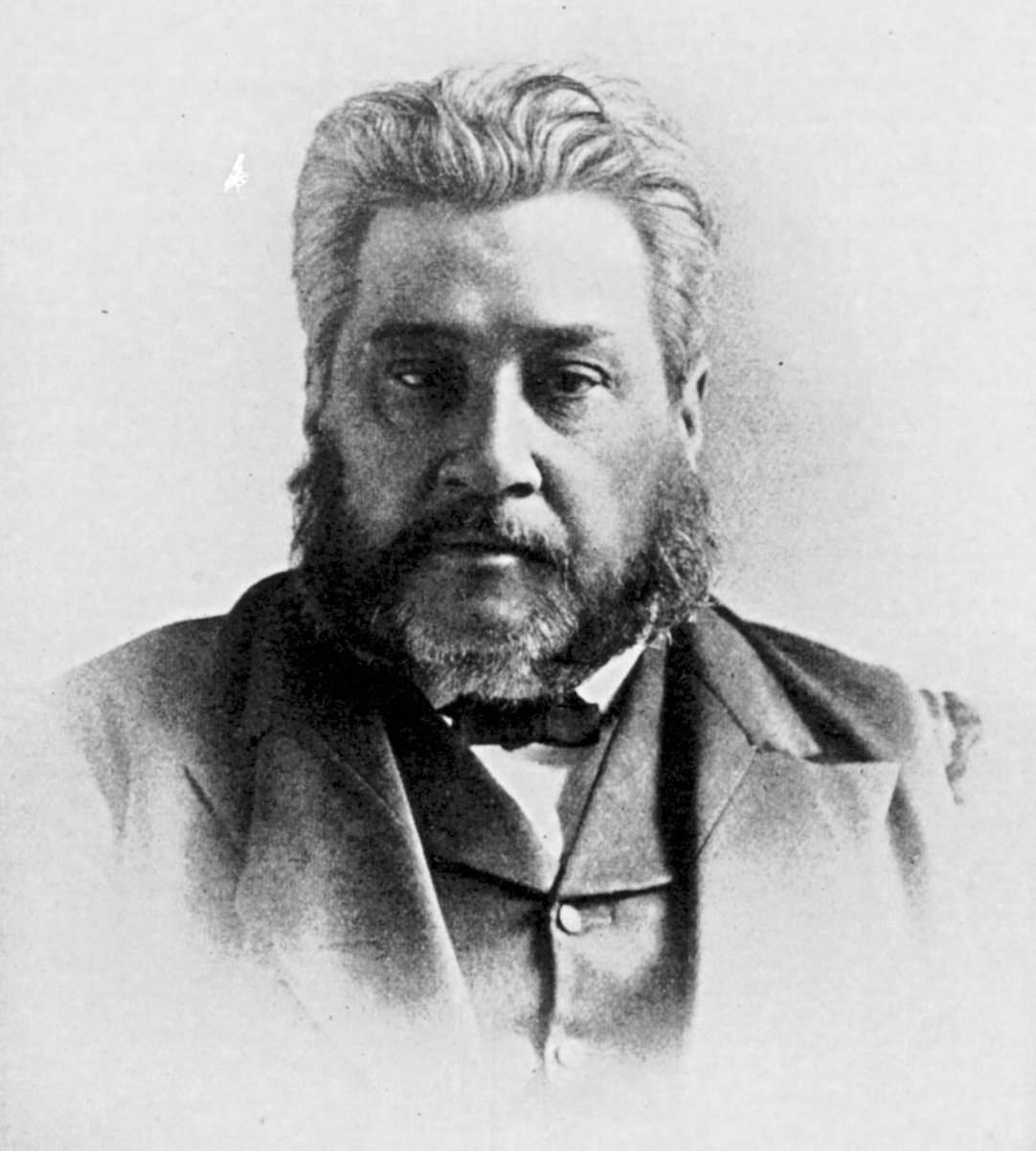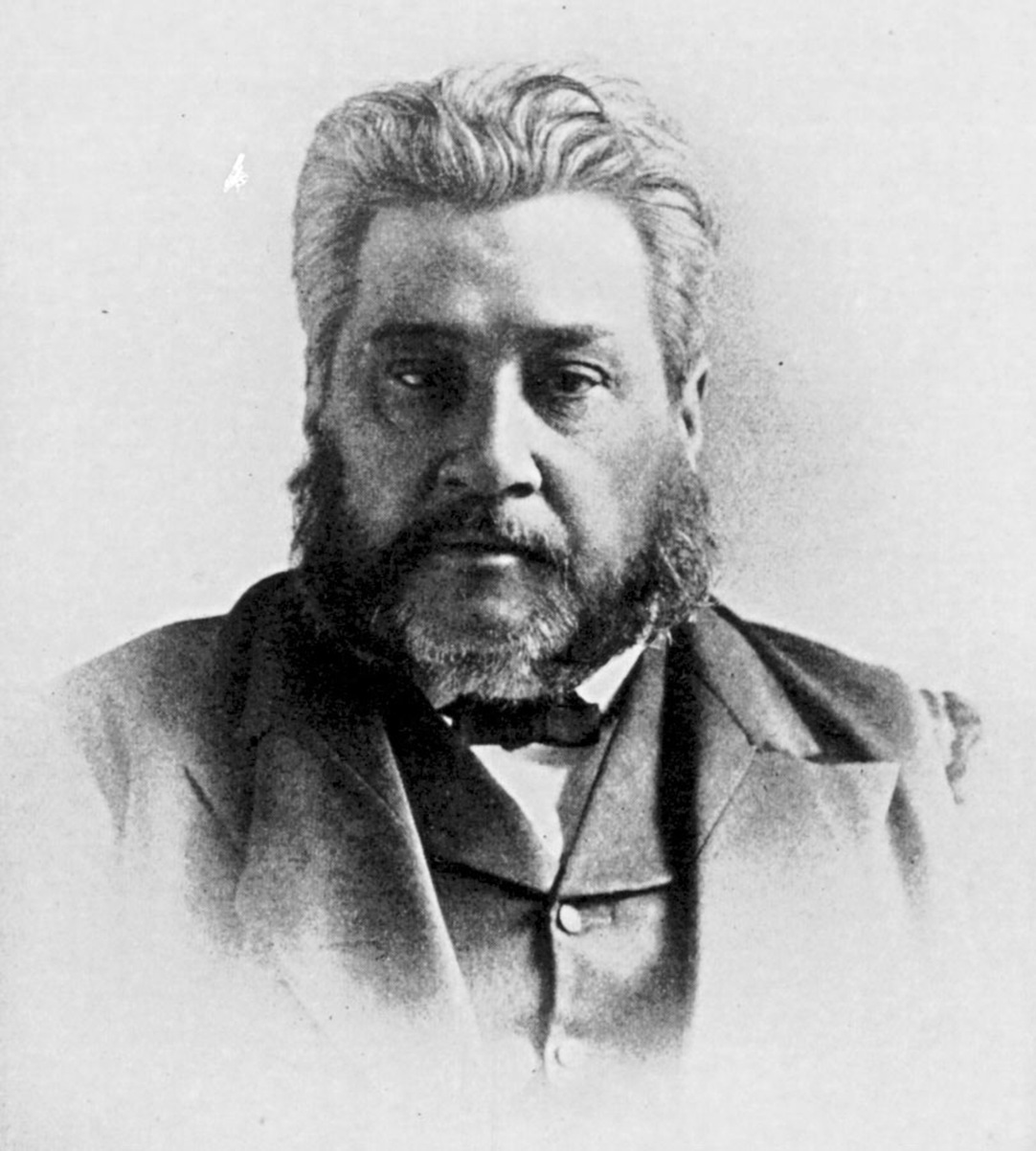 The following is an excerpt of a sermon by Charles Spurgeon called The Warrant of Faith. I believe the words he preached 150 years ago are as relevant today as ever. This part of his sermon opposes much of the legalistic, turn-or-burn, try-or-fry, forsake-or-back type “gospel” being communicated by many preachers today. He exposes what they spouse in this powerful sermon.
The following is an excerpt of a sermon by Charles Spurgeon called The Warrant of Faith. I believe the words he preached 150 years ago are as relevant today as ever. This part of his sermon opposes much of the legalistic, turn-or-burn, try-or-fry, forsake-or-back type “gospel” being communicated by many preachers today. He exposes what they spouse in this powerful sermon.
Spurgeon’s main point in this part of his sermon is that if you have to conjure up some feeling of sorrow for sin, earnestness for Christ, willingness to surrender, etc before you can genuinely put your faith in Jesus then you are putting your trust in those feelings instead of what Jesus did on the cross…and therefore the gospel you are accepting is no gospel at all. This sermon is a shot to the solar plexus of those who preach a works-ladened message. The only more convicting sermon on this subject is the book of Galatians.
Take the time to read and ruminate on the words of Charles Spurgeon. You won’t be disappointed. He was indeed the prince of preachers.
“O, when will all professors, and especially all professed ministers of Christ, learn the difference between the law and the gospel? Most of them make a mingle-mangle, and serve out deadly potions to the people, often containing but one ounce of gospel to a pound of law, whereas, but even a grain of law is enough to spoil the whole thing. It must be gospel, and gospel only.
“Believing” is most clearly explained by that simple word “trust.” Believing is partly the intellectual operation of receiving divine truths, but the essence of it lies in relying upon those truths. I believe that, although I cannot swim, yonder friendly plank will support me in the flood-I grasp it, and am saved: the grasp is faith. Thus faith is accepting God’s great promises, contained in the Person of His Son. It is taking God at His Word, and trusting in Jesus Christ as being my salvation, although I am utterly unworthy of His regard. Sinner, if thou takest Christ to be thy Saviour this day, thou art justified; though thou be the biggest blasphemer and persecutor out of hell…if thou wilt honor God by believing Christ is able to forgive such a wretch as thou art, and wilt now trust in Jesus’ precious blood, thou art saved from divine wrath.
if I believe in Jesus Christ because I feel a genuine repentance of sin, and therefore have a warrant for my faith, do you not perceive that the first and true ground of my confidence is the fact that I have repented of sin? If I believe in Jesus because I have convictions and a spirit of prayer, then evidently the first and the most important fact is not Christ, but my possession of repentance, conviction, and prayer, so that really my hope hinges upon my having repented; and if this be not legal I do not know what is. Put it lower. My opponents will say, “The sinner must have an awakened conscience before he is warranted to believe on Christ.” Well, then, if I trust Christ to save me because I have an awakened conscience, I say again, the most important part of the whole transaction is the alarm of my conscience, and my real trust hangs there. If I lean on Christ because I feel this and that, then I am leaning on my feelings and not on Christ alone, and this is legal indeed. Nay, even if desires after Christ are to be my warrant for believing, if I am to believe in Jesus not because he bids me, but because I feel some desires after him, you will again with half an eye perceive that the most important source of my comfort must be my own desires. So that we shall be always looking within. “Do I really desire? If I do, then Christ can save me; if I do not, then he cannot.” And so my desire overrides Christ and his grace. Away with such’ legality from the earth!
Again, any other way of preaching than that of bidding the sinner believe because God commands him to believe, is a boasting way of faith. For if my warrant to trust in Jesus be found in my experience, my loathings of sin, or my longings after Christ, then all these good things of mine are a legitimate ground of boasting, because though Christ may save me, yet these were the wedding-dress which fitted me to come to Christ. If these be indispensable pre-requisites and conditions, then the man who has them may truly and justly say, “Christ did save me, but I had the pre-requisites and conditions first, and therefore let these share the praise.” See, my brethren, those who have a faith which rests upon their own experience, what are they as a rule? Mark them, and you will perceive much censorious bitterness in them, prompting them to set up their own experience as the standard of saintship, which may assuredly make us suspicious whether they ever were humbled in a gospel manner at all, so as to see that their own best feelings, and best repentances, and best experiences in themselves are nothing more nor less than filthy rags in the sight of God. My dear brethren, when we tell a sinner that foul and filthy as he is, without any preparation or qualification, he is to take Jesus Christ to be his all in all, finding in him all that he can ever need, when we dare on the spot to bid the jailor just startled out of sleep, “Believe in Jesus,” we leave no room for self-glorification, all must be of grace. When we find the lame man lying at the temple gates, we do not bid him strengthen his own legs. or feel some life in them, but we bid him in the name of Jesus rise up and walk; surely here when God the Spirit owns the Word, all boasting is excluded. Whether I rely on my experience or my good works makes little difference, for either of these reliances will lead to boasting since they are both legal. Law and boasting are twin brothers, but free grace and gratitude always go together.
Any other warrant for believing on Jesus than that which is presented in the gospel is changeable. See, brethren, if my warrant to believe in Christ lies in my meltings of heart and my experiences, then if to-day I have a melting heart and I can pour my soul out before the Lord, I have a warrant to believe in Christ. But to-morrow (who does not know this?) to-morrow my heart may be as hard as a stone, so that I can neither feel nor pray. Then, according to the qualification-theory, I have no right to trust in Christ, my warrant is clean gone from me. According to the doctrine of final perseverance, the Christian’s faith is continual, if so the warrant of his faith must be always the same, or else he has sometimes an unwarranted faith which is absurd; it follows from this that the abiding warrant of faith must lie in some immutable truth. Since everything within changes more frequently than ever does an English sky, if my warrant to believe in Christ be based within, it must change every hour; consequently I am lost and saved alternately. Brethren, can these things be so? For my part I want a sure and immutable warrant for my faith; I want a warrant to believe in Jesus which will serve me when the devil’s blasphemy comes pouring into my ears like a flood; I want a warrant to believe which will serve me when my lustings and corruptions appear in terrible array, and make me cry out, “O wretched man that I am;’ I want a warrant to believe in Christ which will comfort me when I have no good frames and holy feelings, when I am dead as a stone and my spirit lies cleaving to the dust. Such an unfailing warrant to belief in Jesus is found in this precious truth, that his gracious commandment and not my variable experience, is my title to believe on his Son Jesus Christ.
Again, my brethren, any other warrant is utterly incomprehensible. Multitudes of my brethren preach an impossible salvation. How often do poor sinners hunger and thirst to know the way of salvation, and there is no available salvation preached to them. Personally, I do not remember to have been told from the pulpit to believe in Jesus as a sinner. I heard much of feelings which I thought I could never get, and frames after which I longed; but I found no peace until a true, free grace message came to me, “Look unto me and be ye saved, all the ends of the earth.” See, my brethren, if convictions of soul are necessary qualifications for Christ, we ought to know to an ounce how much of these qualifications are needed. If you tell a poor sinner that there is a certain amount of humblings, and tremblings, and convictions, and heart-searchings to be felt, in order that he may be warranted to come to Christ, I demand of all legal-gospellers distinct information as to the manner and exact degree of preparation required. Brethren, you will find when these gentlemen are pushed into a corner, they will not agree, but will every one give a different standard, according to his own judgment. One will sa the sinner must have months of law work; another, that he only needs good desires; and some will demand that he possess the graces of the Spirit—such as humility, godly sorrow, and love to holiness. You will get no clear answer from them. If the sinner’s warrant to come is found in the gospel itself, the matter is clear and plain; but what a roundabout plan is that compound of law and gospel against which I Contend! And let me ask you, my brethren, whether such an incomprehensible gospel would do for a dying man? There he lies in the agonies of death. He tells me that he has no good thought or feeling, and asks what he must do to be saved. There is but a step between him and death—another five minutes and that man’s soul may be in hell. What am I to tell him? Am I to be an hour explaining to him the preparation required before he may come to Christ? Brethren, I dare not. But I tell him, “Believe. brother, even though it be the eleventh hour; trust thy soul with Jesus, and thou shalt be saved.” There is the same gospel for a living man as for a dying man. The thief on the Cross may have had some experience, but I do not find him pleading it; he turns his eye to Jesus, saying, “Lord, remember me !” How prompt is the reply, “To-day shalt thou be with me in paradise.” He may have had onging desires, he may have had deep convictions, but I am quite sure he did not say, “Lord, I dare not ask thee to remember me, because I do not feel I have repented enough. I dare not trust thee, because I have not been shaken over hell’s mouth.” No, no, no; he looked to Jesus as he was, and Jesus responded to his believing prayer. It must be so with you, my brethren, for any other plan but that of a sinner’s coming to Christ as a sinner, and resting on Jesus just as he is, is utterly incomprehensible, or, if it is to be explained at all, will require a day or two to explain it ill; and that cannot be the gospel which the apostles preached to dying men.
Yet again, I believe that the preaching of alarms of conscience and repentance as qualifications for Christ, is unacceptable to the awakened sinner. I will introduce one, as Saltmarsh does in his “Flowings of Christ’s Blood Freely to the Chief of Sinners.” Here is a poor brother who dares not believe in Jesus. I will suppose him to have attended a ministry where the preaching is “If you have felt this, if you have felt that, then you may believe.” When you went to your minister in trouble, what did he say to you? “He asked me whether I felt my need of Christ, I told him I did not think I did, at least I did not feel my need enough. He told me that I ought to meditate upon the guilt of sin, and consider the dreadful character of the wrath to come, and I might in this way feel my need more.” Did you do so? “I did; but it seemed to me as if while I meditated upon the terrors of judgment, my heart grew harder instead of softer, and I seemed to be desperately set, and resolved in a kind of despair to go on in my ways; yet, some-times I did have some humblings and some meltings of heart.” What did your minister tell you to do to get comfort then? “He said I ought to pray much.” Did you pray? “I told him I could not pray; that I was such a sinner that it was of no use for me to hope for an answer if I could.” What did he say then? “He told me I ought to lay hold upon the promises.” Yes, did you do so? “No; I told him I could not lay hold upon the promises; that I could not see they were meant for me, for I was not the character intended; and that I could only find threatenings in the Word of God for such as I was.” What did he say then? “He told me to be diligent in the use of the means, and to attend his ministry.” What did you say to that? “I told him I was diligent, but that what I wanted was not means, I wanted to get my sins pardoned and forgiven.” What did he say then? “Why, he said that I had better persevere and wait patiently for the Lord; I told him that I was in such a horror of great darkness, that my soul chose strangling rather than life. Well then, he said, he thought I must already be truly penitent, and was therefore safe, and that sooner or later I should have hope But I told him, a mere hope was not enough for me, I could not he safe while sin lay so heavy upon me. He asked me whether I had not desires after Christ. I said I had, but they were merely selfish, Carnal desires; that I sometimes thought I had desires, but they were only legal. He said if I had a desire to have a desire, it was God’s work, and I was saved. That did prop me up for a time, sir, but I went down again, for that did not do for me, I wanted something solid to rest on.” And sinner, how is it now with you? where are you now? “Well, sir, I scarce know where I am, but I pray you, tell me what I must do?” Brethren, my reply is prompt and plain; hear it. Poor soul, I have no questions to ask you; I have no advice to give you, except this, God’s command to you is, whatever you may be, trust to the Lord Jesus Christ, and you shall be saved. Will you do it or no? If he rejects that, I must heave him; I have no more to say to him; I am clear of his blood, and on him the sentence comes, “He that believeth not shall be damned.” But you will find in ninety-nine Cases out of one hundred, that when you begin to talk to the sinner, not about his repentings and his desirings, but about Christ, and tell him that he need not fear the law, for Christ has satisfied it; that he need not fear an angry God, for God is not angry with believers; tell him that all manner of iniquity was Cast into the Red Sea of Jesus’ blood, and, like the Egyptians, drowned there for ever; tell him that no matter however vile and wicked he may have been, “Christ is able to save unto the uttermost them that come unto God by him;” and tell him that he has a right to come, be he who he may, or what he may, because God bids him come; and you will find that the suitability of such a gospel to the sinner’s case, will prove a sweet inducement in the hand of the Holy Spirit, to lead that sinner to lay hold on Jesus Christ. O my brethren, I am ashamed of myself when I think of the way in which I have sometimes talked to awakened sinners. I am persuaded that the only true remedy for a broken heart is Jesus Christ’s most precious blood. Some surgeons keep a wound open too long; they keep cutting, and cutting, and cutting, till they cut away as much sound flesh as proud flesh. Better by half heal it, heal it at once, for Jesus Christ was not sent to keep open the wounds, but to bind up the broken in heart. To you, then, sinners of every sort and hue, black, hard-hearted, insensible, impenitent, even to you is the gospel sent, for “Jesus Christ came into the world to save sinners,” even the chief.
I might here pause, surely, but I must add yet one other point upon this negative mode of reasoning. Any other warrant for the sinner’s faith than the gospel itself, is false and dangerous.
It is false, my brethren, it is as false as God is true, that anything in a sinner can be his warrant for believing in Jesus. The whole tenour and run of the gospel is clean contrary to it. It must be false, because there is nothing in a sinner until he believes which can be a warrant for his believing. If you tell me that a sinner has any good thing in him before he believes, I reply, impossible—”Without faith it is impossible to please God.” All the repentings, and humblings, and convictions that a sinner has before faith, must be, according to Scripture, displeasing to God. Do not tell me that his heart is broken; if it is only broken by carnal means, and trusts in its brokenness, it needs to be broken over again. Do not tell me he has been led to hate his sin; I tell you he does not hate his sin, he only hates hell. There cannot be a true and real hatred of sin where there is not faith in Jesus. All the sinner knows and feels before faith is only an addition to his other sins, and how can sin which deserves wrath be a warrant for an act which is the work of the Holy Spirit?
How dangerous is the sentiment I am opposing. My hearers, it may be so mischievous us to have misled some of you. I solemnly warn you, though you have been professors of faith in the Lord Jesus Christ for twenty years, if your reason for believing in Christ lies in this, that you have felt the terrors of the law; that you have been alarmed, and have been convinced; if your own experience be your warrant for believing in Christ, it is a false reason, and you are really relying upon your experience and not upon Christ: and mark you, if you rely upon your frames and feelings, nay, if you rely upon your communion with Christ, in any degree whatever, you are as certainly a lost sinner as though you relied upon oaths and blasphemies; you shall no more be able to enter heaven, even by the works of the Spirit—and this is using strong language—than by your own works; for Christ, and Christ alone, is the foundation, and “other foundation can no man lay than that is laid, which is Jesus Christ.” Take care of resting in your own experience. All that is of nature’s spinning must be unravelled, and everything that getteth into Christ’s place, however dear to thee, and however precious in itself, must be broken in pieces, and like the dust of the golden calf, must be strawed upon the water, and thou wilt be made sorrowfully to drink of it, because thou madest it thy trust. I believe that the tendency of that preaching which puts the warrant for faith anywhere but in the gospel command, is to vex the true penitent, and to console the hypocrite; the tendency of it is to make the poor soul which really repents, feel that he must not believe in Christ, because he sees so much of his own hardness of heart. The more spiritual a man is, the more unspiritual he sees himself to be; and the more penitent a man is, the more impenitent he discovers himself to be. Often the most penitent men are those who think themselves the most impenitent; and if I am to preach the gospel to the penitent and not to every sinner, as a sinner, then those penitent persons, who, according to my opponents, have the most right to believe, are the very persons who will never dare to touch it, because they are conscious of their own impenitence and want of all qualification for Christ. Sinners, let me address you with words of life: Jesus wants nothing of you, nothing whatsoever, nothing done, nothing felt; he gives both work and feeling. Ragged, penniless, just as ye are, lost, forsaken, desolate, with no good feelings, and no good hopes, still Jesus comes to you, and in these words of pity he addresses you, “Him that cometh to me I will in no Wise cast out.” If thou believest in him thou shalt never be confounded.”
Boom! To read the rest of the sermon go here.






